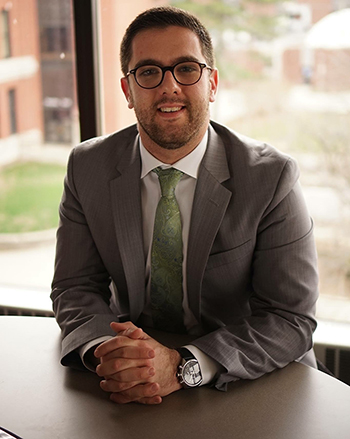
Idan Rafalovitz
You may not think it, but deep in the heart of Illinois, a significant population of students could be affected by the rollback of Deferred Action for Childhood Arrivals (DACA) protections. Chief of Staff of Illinois State University’s student government Idan Rafalovitz, however, thinks his team will soon be well-equipped to help such students and others with a new inclusion initiative launched by USC Shoah Foundation.
The senior, who studies finance and accounting, attended in June the largest gathering of student body presidents in the country, the National Campus Leadership Council’s Presidential Leadership Summit in Washington, D.C. Between a presentation from a USC Shoah Foundation representative there and discussions with his university’s student body president Beau Grzanich, Rafalovitz came to realize how beneficial a partnership with USC Shoah Foundation could be for his student body.
“After doing some research about the mission and vision of USC Shoah Foundation, it was a no-brainer that I get involved,” he said.
At the conference, USC Shoah Foundation Director of Programs and Operations Kori Street gave a keynote presentation about the different forms of hate that can happen on campuses, from LGBTQ discrimination to antisemitism, and about fostering inclusivity and preventing hate on college campuses. She also introduced a new program for student leaders called the Intercollegiate Diversity Congress.
The Intercollegiate Diversity Congress (IDC) Summit, to be held Oct. 13-14, 2017, on the USC campus, will convene student leaders from higher education campuses across the United States to support their efforts in building inclusive, connected communities. USC Shoah Foundation will provide resources and training for the student leaders to be able to convene groups of students, staff and faculty to explore and engage in dialogue around campus climate issues.
The IDC Summit is a program of the Institute's Countering Antisemitism Through Testimony initiative.
“I want to participate because, as a student leader and as an Israeli on campus, I witness the many different issues that face campuses across the country when it comes to inclusion and diversity, whether it be the Jewish population or other groups across these campuses,” Rafalovitz said. “Being able to take back some lessons from the weekend at USC back to my campus will allow my team to implement different ideas and plans to improve our campus inclusion across the board.”
Among the resources that will be available to student leaders like Rafalovitz is an IWitness toolkit activity called Reflections and Action on Campus Diversity, designed for student leadership councils to address various kinds of discrimination and prejudice, and to decide how to take action on campus to foster acceptance and celebration of differences.
“As student leaders, it’s our job to represent every single one of our students in the shared governance process,” Rafalovitz said. “Issues of diversity and inclusion arise on our campus often, and it’s important to address these concerns and to actually implement plans of action.”
For Rafalovitz, the missions of USC Shoah Foundation align well with his own plans for increasing tolerance and awareness on his campus.
“Our campus has had students that have been affected by the decision to repeal DACA,” Rafalovitz said. “Though our university administration and student leaders have taken a supportive stance to protect those students, there is still a lot of be done. Student government has chosen to take a proactive rather than a reactive approach, and supports a solution with a true path to citizenship for early arrival undocumented immigrants.”
Rafalovitz hopes the IDC Summit will supply him with the tools to educate students on his campus about the key issues that affect them, and supplement the initiatives his team has already started.
“There are students on our campus that feel marginalized,” Rafalovitz said. “It is our responsibility to create an environment that is inclusive of every single student on our campus. Educating students is the first step to creating an environment that is more aware in general.”
During the Congress, Rafalovtiz looks forward to engaging with other campus leaders and learning from USC Shoah Foundation’s staff.
“I would like to implement plans of action on our campus alongside our other student leaders,” Rafalovitz said. “I would like to gain the skills and obtain the necessary resources to create a process that educates students using personal accounts that preserve history, and teaches us how to solve some of the issues we face everyday on campus.”